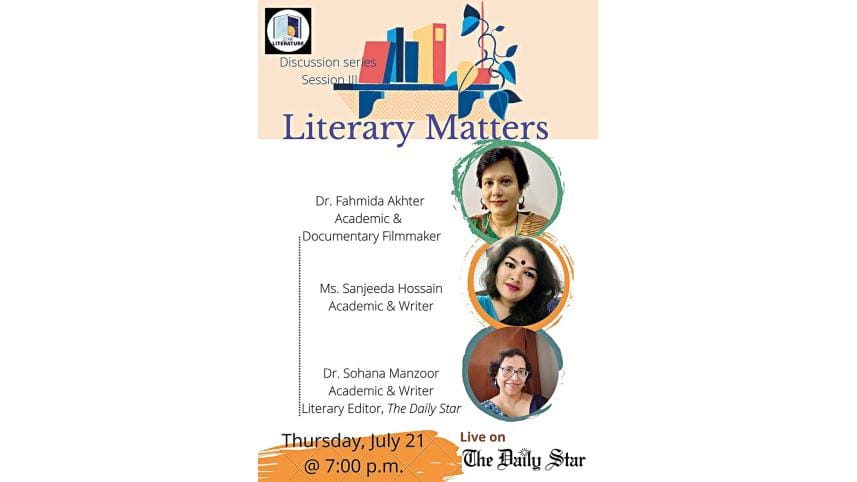On Literary Matters

There are many platforms that integrate writers and poets. But somehow, academics are only thought of when one becomes a celebrity. Literary Matters, an online literary discussion series, was launched by The Daily Star in May 2022 with the thought of bringing in the up-and-coming academics who are also involved in other creative and intellectual areas. In the last three sessions of Literary Matters, a total of six such individuals were invited and the programs were livestreamed through Facebook and YouTube. Prof. Sabiha Huq of Khulna University, Noora Shamsi Bahar of North South University, Prof. Shafiqul Islam of Shahjalal University of Science and Technology and Mohammad Mosiur Rahman of ULAB were the four guests of the first two session. The host of the program is Dr. Sohana Manzoor, the Literary Editor of The Daily Star and an associate professor of English, ULAB. She is assisted by Ziauddin Al-Amin Shiplu, a member of the multimedia team of the Daily Star.
The third session of Literary Matters was held Thursday, July 21 and the guests were Dr. Fahmida Akhter from Jahangirnagar University and Sanjeeda Hossain from the University of Dhaka. A professor of the Department of Drama and Dramatics, Fahmida Akhtar spoke of her deep-rooted passion for documentary film making which she started in the early 2000s when there were very few women in the business. She worked with many renowned figures like Subarna Mustapha and Jaya Ahsan. With a smile and a twinkle in her eyes she stated that if she were not in the academia, she would not have gone for her PhD. These days, however, because of her teaching constraints and publication demands, she has almost given up on film-making. But she hopes to return to it once she gets some free time for herself. She believes that the best part of teaching is being able to connect with the younger bodies of students that never ceases to amaze her. While addressing the issue of challenges faced by women, Dr. Akhter mentioned that in a patriarchal setting a woman is constantly pressure of compromising work because of her children. She pointed out how raising children is a full-time work, but she like many other women is also a full-time teacher as well. No wonder that women have greater adaptability than men.
Sanjeeda Hossain, a young and enthusiastic faculty member of the Department of English, University of Dhaka, holds a more optimistic view of women's position in society. She thinks that as more and more women are joining the work force, people's view of women is also gradually changing. She herself is a working mother and has to juggle between work and parenting. She had always wanted to be a teacher and being able to teach means the world to her. Both Prof. Akhter and Hossain are indebted to their mothers for their support in their careers in different ways. They admitted that while balancing work and household activities are somehow doable, but it is very difficult to find time for their other passions; e.g. film making and writing.
At one point of the discussion, Dr. Fahmida spoke of the Liberation War of 1971, which continues to be a wound for the creative minds in Bangladesh. She concurred with the host that is the most significant and celebrated chapter of our history. But she also pointed out that the popular depiction of the War often angers her because the "Muktujuddho" has been appropriated by the male gaze. A woman mostly plays a sacrificial role in most films and stories on the Liberation War. Hence Dr. Fahmida claims that she is inspired by the ethos, but her creativity rises out of a deep sense of frustration.
In this connection Ms. Hossain spoke of motherhood and how it has a special meaning for her as she idolizes her own mother. At her workplace too, she is surrounded by powerful women who are, at the same time, very good mothers. She also referred to mother figures of literature from Jocasta to Gertrude and even Miss Havisham. For her, mother figures are powerful and complex.
Finally, the discussion took an intriguing turn – to podcasts, youtube, blog posts and social media. Both the guests admitted that it is impossible to remain connected to each other in this world without social media. As a researcher, Dr. Akhter finds Researchgate to be very useful. While both Drs. Manzoor and Akhtar use Facebook, Ms. Hossain avoids it and prefers Instagram instead.
The program came to an end after the guests deliberated on their current projects, publications and other plans. Overall, it was an interesting discussion that focused on problems and prospects of profession and creativity.
Shahriyer Hossain Shetu is a graduate of ULAB. He is interested in translation and creative writing.



 For all latest news, follow The Daily Star's Google News channel.
For all latest news, follow The Daily Star's Google News channel.
Comments